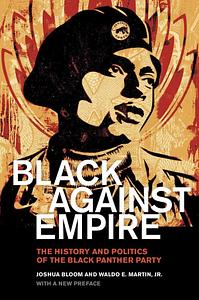Take a photo of a barcode or cover
166 reviews for:
Black against Empire: The History and Politics of the Black Panther Party
Joshua Bloom
166 reviews for:
Black against Empire: The History and Politics of the Black Panther Party
Joshua Bloom
I tried to read this once and could not get into it. I barely got through 50 pages before giving up. A couple years later, I decided to try the audiobook because I was still very interested in the book. It was very informative but it was also dry, dense, and somewhat disjointed.
This is the sort of book correctly described as definitive. I covered a lot of this material previously, but it was scattered over dozens books and scores of photocopied articles. Basically, a lot of work. But this book is so comprehensive and readable, there's no excuse not to know this history now.
challenging
informative
tense
slow-paced
A fascinating and in-depth history of not just the Black Panther Party but the foundations of Revolutionary Black Nationalism in the US. Explaining the conditions which allowed Revolutionary Socialism to build in the US and the conditions which caused it to fall.
challenging
dark
informative
medium-paced
challenging
informative
medium-paced
challenging
dark
informative
inspiring
reflective
tense
fast-paced
7/10. Some disappointments regarding structure and some topics/aspects being skimmed over (lack of clarification on specific Maoist influences, effects on policing, the Party after '72, and on details of certain criminal cases) but ultimately this seems like a more introductory book on the subject, meant for broader appeal, as opposed to a full dissection. On those terms this book fulfills its goal. I plan on doing a more detailed review of this eventually.
So much of what we're taught as kids about the 60s protests and the Civil Rights Movement is bullshit, but it wasn't until very recently that I started to realize that. I found this book incredibly informing because it presents a history of that time from a radical perspective. The way we talk about civil rights, it almost sounds like America was an incredibly racist apartheid state until Martin Luther King Jr assembled protesters to march through the streets, after which LBJ passed some laws and everything was fine and everybody went home happy. In reality, black liberation activists were brutally repressed by the state (MLK was almost certainly assassinated by FBI counter-intelligence, not much different than socialist Chicago Black Panther Fred Hampton was), and they were fighting for much more than just equal voting rights. In such an explosive context, for the one and only time in American history, a revolutionary organization developed a nationwide following and strong political influence: the Black Panther Party. This book gives a comprehensive overview of the Panthers' politics, their rise to prominence in the late 60s, and their dissolution in the 70s. In our current time of political upheaval, I've been particularly interested in the history of revolutionary and socialist movements. This book is one of the best I've read so far, and I really can't recommend it highly enough. As a side note, it has some of the best back-cover blurbs I've ever seen: Cornel West calls it "the definitive history of one of the great revolutionary organizations in the history of this country," Angela Davis praises it for not shying away from the Panthers' contradictions, and Alicia Garza says reading it inspired her to co-found Black Lives Matter. Truly an intellectual and political feast here.
informative
slow-paced








